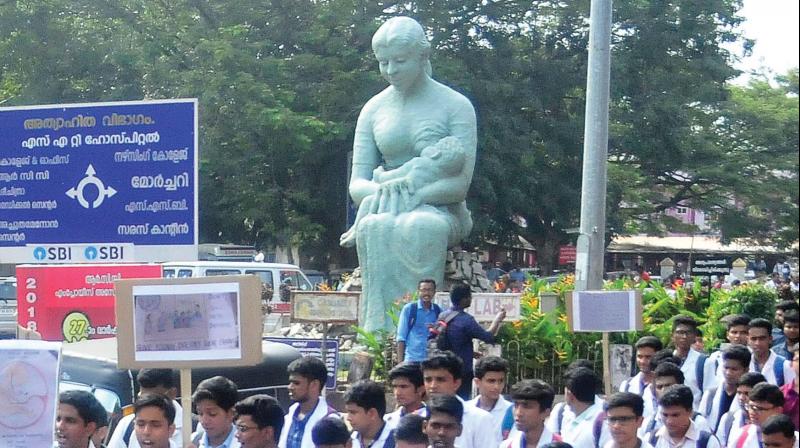Be patient, please
The inhuman attitude with which staff behave with patients in government hospitals is an issue that needs urgent attention.

The small, despised cries, muted responses and the silent humiliation of people, including women in labour, have never been a secret, especially in the government sector. Many cases have come to light in such hospitals pointing to the total neglect and cruelty with which the staff treat the ailing. But they never have been discussed in public, nor attempts made to sensitise people on that.
Now, Dr J.S. Veena, a post-graduate student in Government Medical College, Thiruvananthapuram has recently initiated a campaign on the social media to sensitise the people, and the authorities about the treatment which no civilised society can afford to ignore.
Dr Veena recounted in her Facebook post an incident of such extreme violation of rights with ethical, legal and humanitarian angles. “A 13-year-old pregnant girl, who was admitted to a leading government medical college hospital, kept on crying aloud that none had impregnated her,” she said. “But she was treated as a 'vulgar' woman and not as a 13-year-old by the staff. They did not keep her confidentiality and news spread like wild fire."
Dr. Veena, a Thalassery native, has been on a mission to sensitise and create gender awareness among doctors and nurses in the health sector, especially in the labour room. Dr Veena, who claims that she is ‘over-sensitive’ to issues that affect the common man, sent out a slew of complaints to the Kerala Women’s Commission, State Human Rights Commission, social justice ministry, union and state health ministry et al. Social justice secretary Biju Prabhakar has taken up her complaint and appointed a committee to look into it.
Dr Veena has submitted a charter of demands before the government which included a ‘dignified life’ for abandoned mothers and their children as well as a decent compensation. She has also demanded that a pregnant woman be allowed to have a bystander inside the labour room.
"The state should ensure a labour room protocol and enforce it," she added.
Dr. Santhamma Mathew, former professor of gynaecology at Thiruvananthapuram Medical College Hospital, maintained that government hospitals do not have adequate staff unlike the private sector which might be the reason why staff shout at pregnant mothers.
“In the private sector, the staff are trained to behave well with the patients,” Dr Mathew, who runs a private hospital now, said. “Moreover, we have less number of patients and there are more staff to monitor them. In SAT Hospital, over 30 deliveries take place a day, but in a private hospital, the number will be only four or five.”
Dr. K. Sasidharan, B.C. Roy national award winner and an honorary senior consultant urologist at Kerala Institute of Medical Sciences here said that human rights violations happen in the government sector almost daily.
“We always talk of the rights of the people but we don’t talk about patients’ rights. These days a section of doctors is reluctant to converse with the patients regarding their illnesses and the kind of treatment to be given,” he said.
Another former student of Thiruvananthapuram Medical College Hospital, who did her MBBS and PG there, recalled an incident several years ago when an under-aged girl had given birth. Those days the attenders were sensitive about the issue, said the gynaecologist who is working in a private hospital. “Government hospitals have a different work culture which cannot be changed overnight. Doctors and nurses are working under high pressure in SAT Hospital as well as in Women and Children Hospital, Thycaud,” she said.
Dr. S. Shaila, professor in gynaecology at SAT Hospital, said that pregnant women come from as far as Kanyakumari, Kozhencherry and Tiruvalla who belong to the high risk category. “The literacy level of lower level staff members at the government hospitals might be poor. They might vent out their feelings against unwed young mothers. I feel that the case highlighted by Dr Veena is an isolated one,” said Dr. Shaila.
Jasmine Shah, president of the United Nurses Association, said that nurses might shout at pregnant women in labour pain. He admitted that human rights violations happen in both private and government health sectors. "A few years ago, a pregnant woman was verbally abused at a government hospital in Thrissur because she was not taking any initiative to push the baby out," said Jasmine Shah.
It’s not the women and the poor who suffer neglect at government hospitals. In 1987 when filmmaker John Abraham fell from a house top after a party, he was rushed to Kozhikode Medical College Hospital. But the hospital staff did not identify him and he was denied proper medical attention which led to his death. Years later, Dr. B. Ekbal, who was a surgeon at the Kozhikode Medical College, revealed that John Abraham could have been saved if his identity was known to the doctors at the time of his admission. “It may not happen overnight but we need to begin it somewhere to change the quality of service patients get,” said Dr Veena. “We owe it to ourselves.”

